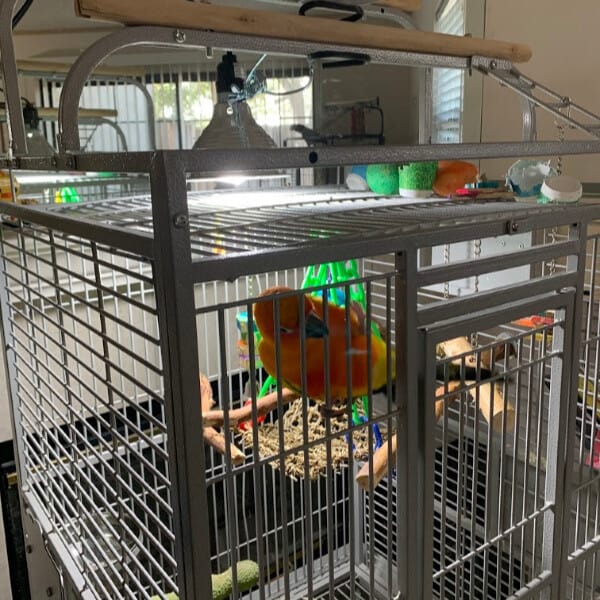Last Updated on by Mitch Rezman
Christina writes
Hello! I have a very hormonal male sun conure around ~10 years old. When he is out of his cage with me, all he wants to do is regurgitate anywhere and everywhere and go in my clothes.
Even in his cage, he regurgitates on things and humps some of his toys. I’m just not sure what kind of setup I can provide for him that will calm him down and let him play and have interests other than mating. 🙁
Do you have tips? Most tips seem to be for female birds, I’ve never had such a hormonal male though!
Dear Christina
We fully believe that males suffer from hormonal behavior as much as females do. They just don’t lay eggs.
We would treat him to light therapy just as we would a female bird.
Basically, you want them to feel like they are in the summer.
Birds don’t act hormonally in the middle of summer.
That is what the lights do for them.
Install a light fixture as close as possible to the top of the birdcage.
Insert a full spectrum bulb and leave it on for 72 hours straight.
Yes, at night you can cover the cage and the light fixture.
The newer bulbs don’t get that hot.
Also, remove all huts and beds. Birds don’t need beds. Dark areas are meant for creating a family.
After 72 hours you can set your lighting on a timer to go on for 12 hours and off for 12 hours. Forever. Currently, we like 7:30 am to 7:30 pm.
No more allowing the bird to crawl into your clothing. Only pet him from the neck up.
In extreme cases, you can repeat the treatment again after a week if no results and leave the lights on for 7 days straight.
The lights reset the circadian rhythm and shut down active hormones.
Remaining behavior is usually a habit that you can start to retrain against.
The Double Double Bird Cage Lighting Project – Upgrade
I would recommend a full spectrum bulb in a fixture placed as close as possible to the top of the cage on a timer set 12 hours on and 12 hours off year-round. This will help keep your bird even hormonally.
Economy bulb – LIGHTING Category – OUR BLOG POSTS ON LIGHTING
I hope this helps.
After trying this please let me know in 30 days how it has improved.
We love pictures too.
Christina replied
Thank you so much for the info! I did not realize the same treatment was as successful in males.
I’ve read about it recently from your postings and also recommended it to my sister with an egg happy lovebird…I will try this! Thank you!
Dear Christina
Yes, glad you understand.
We are currently going into the second day of a 72 hour light treatment for our new rescued 8 yo male quaker parrot Chili.
He has been with us a week now and we can see he is hormonal, masturbating, snapping, wanting to feed us, etc.
His first night went well.
Lighting can not cure “crazy bird syndrome”
He snoozed and didn’t call out a lot at all.
(We cover their cages at night. His cage was also covered but still allowing the light to shine inside fully). Yes, they can sleep with the light on.
Let us know how it works out.
Christina replied
I will definitely let you know how he does! I will order one of your light setups soon.
The full spectrum bulb, clamp-on fixture, and mechanical timer.
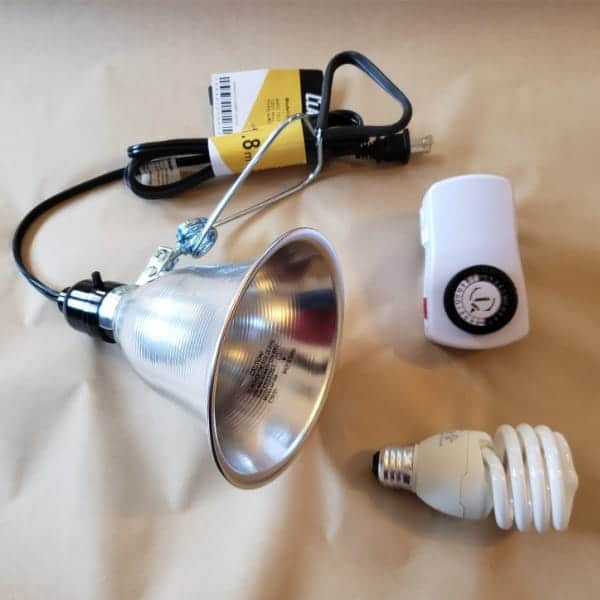
Full Spectrum Economy Daylight
Bulb with Clamp Light & Timer
Looking forward to having my happy buddy back.
Dear Christina
We received your order.
It is shipping today.
Thank you!
Christina replied
Got it!
Christina replied
Hi! Here’s my update: After 72 hours of 12-hour lighting followed by a week of 12 hours on, 12 hours off, Perry is still trying to regurgitate frequently, but only on fabrics during his out-of-cage time.
He seems to have stopped doing it while inside his cage. I’m going to try the extreme case of one week with the light on. Anyway, I just wanted to let you know what’s going on. Thanks for your help so far.
Dear Christina
Did you mean 72 hours of 24-hour lighting? If you did the 72 hours, you can rest a week to see if the behavior settles down. if not, do the whole week. Some of it may have become a habit too. So it can take time to slow down. You would need to restrict his time “on” you.
You can have him on a stand near you so you are together but cut back the time on you to just sit dramatically.
He should only be on you for traveling, Like from one room to another, etc. Not enough time for him to start regurgitating.
Christina replied
Yes, we did 72 hours of 24-hour lighting, followed by one week of rest (just 12 hours on and 12 hours off, so he has a normal night time).
Now we’re starting the week…I feel bad for him, he really yells for his bedtime darkness! I will work on spending time with him near me instead of on me too. Thanks for that tip.
Christina, Great!
Shoulder riding is not a given, it is an earned privilege. We recently adopted a quaker who is very human imprinted and wants to be on you all the time or call out over and over.
We found he was hormonal and was trying to either feed my mouth or be fed by my mouth. Neither is allowed now.
I now pick him up with my hand and then hold my arm vertically, and don’t allow him to just scurry across up to my shoulder.
He has to stay on my upright hand until I place him somewhere, not holding him so long that he becomes fussy or tries to beak me.
He was light treated for 4 solid days and nights. He only called out the first night, and then was fine the next 3.
He is less demanding now and he is not allowed to be on our shoulders for very long.
He goes on my shoulder during “walkies” as I go here and there. Then he is put back on his cage or a stand.
If I just “sit” with him on me he starts picking my face, mouth, hoping to be fed (his last owner let him eat from her mouth) so I just don’t leave him on me long enough to start that.
I feel over time that will ease off. He is still somewhat hormonal, he “loves” his perches a little more than I care for. But I feel confident with the strong lighting over his cage that he will ease out of that in a couple of weeks.
It is that time of year and most of the birds everywhere are feeling it. LOL. What we want to do is not have them continue to be hormonal ALL year long.
I am also trying to get him to play with toys more and not just me. I tossed in a golf ball-sized whiffle ball that he yelled at the first day, then the next took it and banged it on the cage floor to get my attention, that is fine. We chat back and forth. he needs to learn to have fun on his own.
I hope both of our hormonal babies get through this soon.
Keep me in the loop.
Christina replied
Your quaker sounds almost exactly like my conure, except for the mouth feeding part. I always treasured his snuggliness but did not realize this behavior was detrimental 🙁
He is definitely very attached to just me. We’ll have a lot of behavior to work through… I’m glad that his regurgitation in his cage has started to settle down, but like yours..he gets too friendly outside the cage perches still.
I hope he can become more independent. He’s already showing more interest in his toys other than just regurgitating on them.
Dear Christine
The mouth feeding was something the past owner told me after we took him in. I was a bit shocked that she did this with the bird, but as I now had him, I didn’t say what a bad thing that was.
Between the over-bonding issue and the passing of our bad bacteria to the bird, it was all bad.
Yes, we all love a sweet, cuddly feathered pet until we find that we have created a hormonal beast.
Ideally, we should only touch our pet birds from the neck up. They LOVE that.
In the wild birds do not touch each other from the neck down except in season to pair off, mate, etc.
They do preen mutually from the neck up because birds can’t reach those parts and it is a common social thing to do. That is what we should do as well to help keep our relationship with our bird in perspective.
We want to be our bird’s buddy, not its sexual mate.
Changing how you handle him, it should also help over time to ease the regurgitation behavior.
Let me know how he is behaving in 30 days.
Catherine
Author Profile

Latest entries
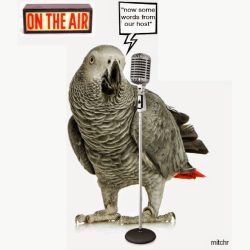 Bird & Parrot CareJune 20, 2025Understanding the Best Way to Use Prevue Pets Mimic Me Voice Trainer
Bird & Parrot CareJune 20, 2025Understanding the Best Way to Use Prevue Pets Mimic Me Voice Trainer Bird BehaviorJune 6, 2025How Do I Keep My Parrot From Dumping His Food Every Day?
Bird BehaviorJune 6, 2025How Do I Keep My Parrot From Dumping His Food Every Day?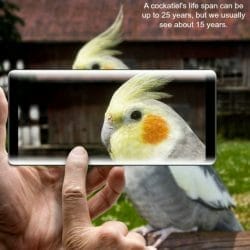 Birds & LightingMay 16, 2025I Am Seeking Clarity About Lighting for My Birds Cage
Birds & LightingMay 16, 2025I Am Seeking Clarity About Lighting for My Birds Cage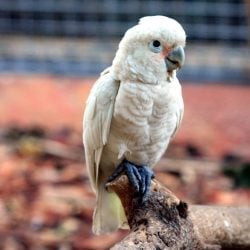 Bird RescueApril 29, 2025How Do We Re-Home a 17 yr Goffin Cockatoo?
Bird RescueApril 29, 2025How Do We Re-Home a 17 yr Goffin Cockatoo?
